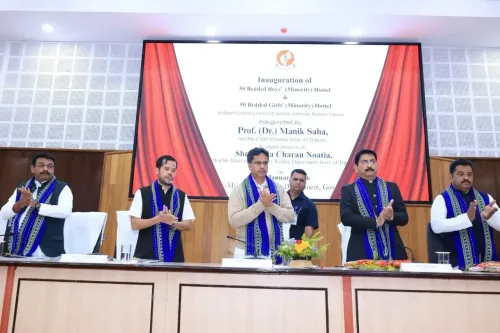Why Does India Lead in AI Skills Penetration According to the UNDP Report?

Synopsis
Key Takeaways
- India leads globally in AI skills penetration.
- Over five million software developers bolster India's AI growth.
- AI is transforming sectors like healthcare and agriculture.
- Human Development Index progress is stalling globally.
- There is a need for a human-centered approach to AI.
New Delhi, May 6 (NationPress) India boasts the highest level of self-reported AI skills penetration globally, showcasing the country's expanding capabilities in this field, as stated in a recent UNDP report published on Tuesday.
In a testament to India's advancing artificial intelligence (AI) proficiency, the United Nations Development Programme (UNDP) highlighted that the nation has made significant progress in utilizing AI to uplift farmers and small enterprises.
The report emphasizes that with a robust pool of over five million software developers, India is well-positioned for ongoing growth in AI technologies.
Additionally, it points out that AI is being effectively integrated into vital sectors such as healthcare and agriculture.
While the report notes that human development is facing an unprecedented slowdown, it also suggests that Artificial Intelligence (AI) could be leveraged to stimulate development.
Pedro Conceicao, the Director of UNDP’s Human Development Report Office, remarked, "The decisions we make in the upcoming years will shape the legacy of this technological shift for human development. With appropriate policies and a focus on individuals, AI can serve as a pivotal link to new knowledge, skills, and ideas that can empower everyone from farmers to small business proprietors."
The forthcoming 2025 Human Development Report, titled "A Matter of Choice: People and Possibilities in the Era of Artificial Intelligence (AI)," examines development progress across several indicators known as the Human Development Index (HDI), which reflects achievements in health, education, and income levels. Projections for 2024 indicate that HDI progress is stalling worldwide.
Amidst a concerning slowdown in global development, the report also uncovers increasing disparities between affluent and impoverished nations. As conventional pathways to development face constraints from global pressures, decisive measures are essential to steer the world away from prolonged stagnation in progress.
Despite significant disparities, the Asia-Pacific region demonstrated some of the fastest advancements in human development from 1990 to 2023, with both East Asia and the Pacific and South Asia improving their Human Development Index scores by over 50 percent, reaching values of 0.775 and 0.672, respectively. The HDI gauges the average achievements across three fundamental dimensions of human development: a long and healthy life, knowledge, and a decent standard of living.
Compared to 2022, South Asia recorded the most rapid growth in HDI in 2023, with a 4.8 percent increase, while East Asia and the Pacific experienced a 1.2 percent enhancement.
“In the face of global upheaval, we must urgently seek innovative ways to drive development,” Steiner stated. “As Artificial Intelligence rapidly evolves in numerous facets of our existence, we should consider its potential for development. New capabilities are emerging almost daily, and while AI is not a cure-all, the choices we make possess the potential to rekindle human development and pave new paths and opportunities.”
The report presents findings from a new survey, revealing that people are both realistic and optimistic about the changes AI could bring.
Half of survey participants worldwide believe their jobs might be automated, while an even greater proportion – six out of ten – expect AI to positively influence their employment, creating opportunities for jobs that may not even be in existence today.
The report advocates for a human-centric approach to AI, which can fundamentally transform development strategies. Survey results indicate that globally, individuals are prepared for this type of ‘reset’.
The report delineates three critical areas for action, including fostering an economy where individuals collaborate with AI rather than competing against it, embedding human agency throughout the AI lifecycle from design to deployment, and modernizing education and health systems to align with 21st-century demands.
The democratization of AI is already underway, with approximately one in five survey respondents reporting that they already utilize AI. Moreover, two-thirds of respondents in lower human development nations anticipate engaging with AI in education, healthcare, or employment within the next year, according to the report.










